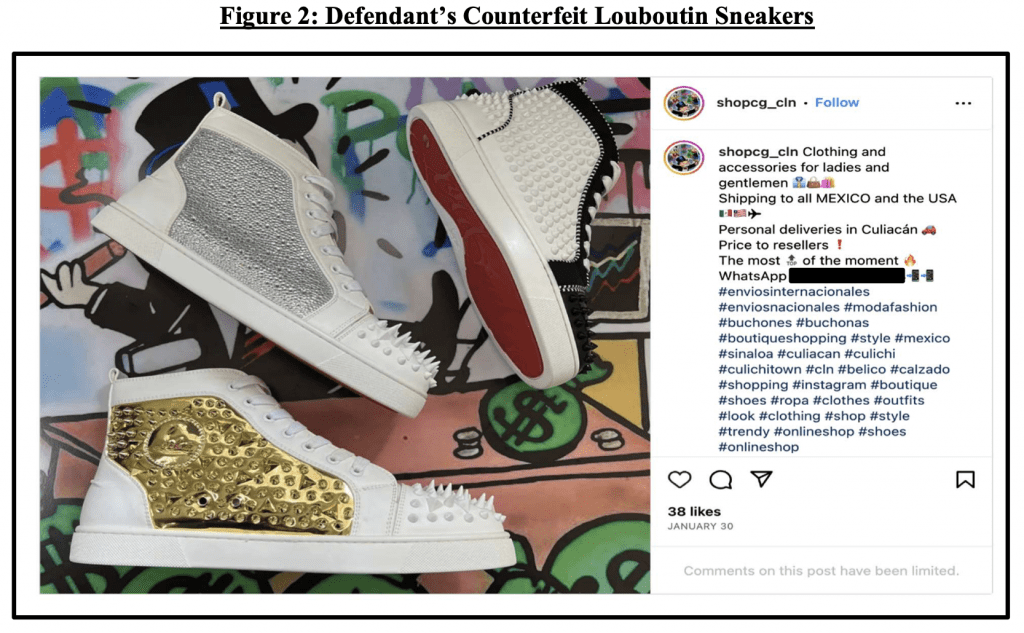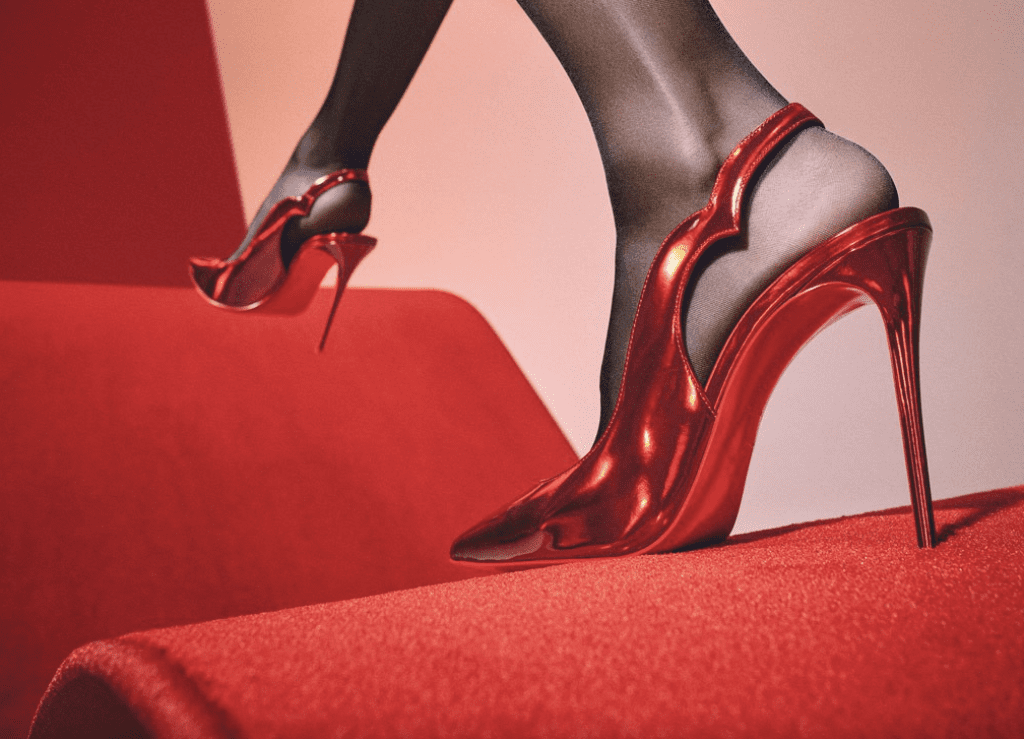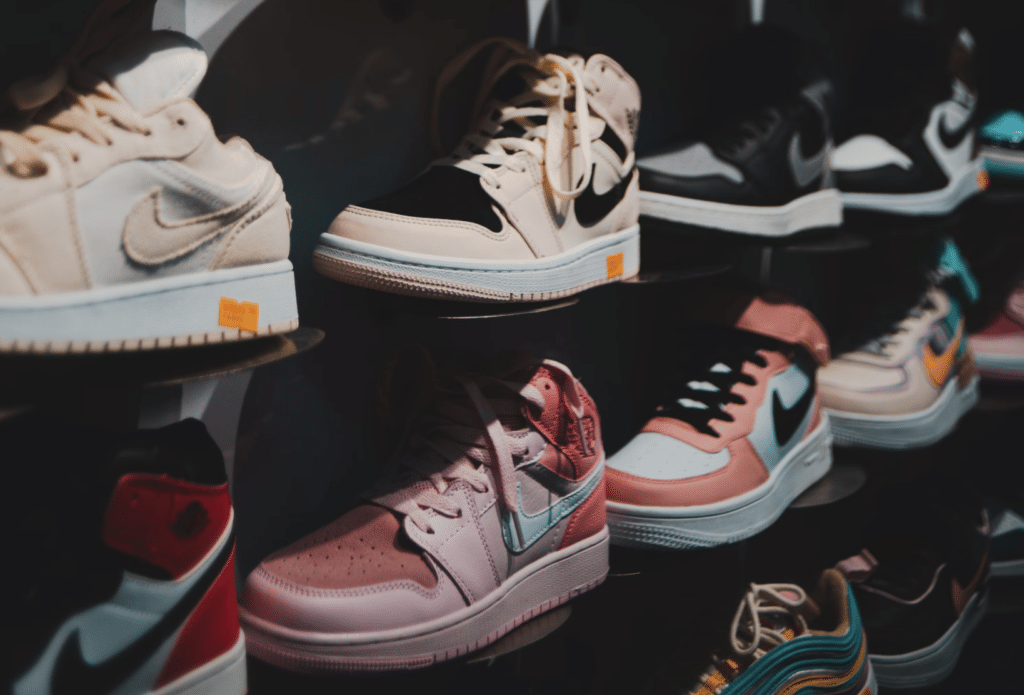Meta Platforms has filed its latest anti-counterfeiting action, teaming up with Christian Louboutin to file suit against a seller of counterfeits on Facebook and Instagram. According to the complaint that they jointly filed in a federal court in California on Thursday, Meta and Louboutin assert that “since at least June 2020 and continuing until at least May 2023, Defendant Cesar Octavio Guerrero Alejo has operated an online business, trafficking in illegal counterfeit goods,” including footwear that infringes and dilutes Louboutin’s various trademarks, such as its famed red sole mark.
In the newly-filed complaint, Meta and Louboutin allege that beginning in 2020, Alejo’s Facebook and Instagram accounts and as many as 44 different Facebook pages listed “dozens of counterfeit [shoes, handbags, and accessories] products for sale featuring designer brand names, including Louboutin.” Specifically, they assert that he promoted luxury “‘clothes and accessories for women and men’ to consumers and resellers,” in connection with which he offered “100% secure shipments … to all of Mexico and the United States.”
The problem, per Meta and Louboutin, is that the Louboutin-branded goods that were “not genuine products of Louboutin,” the plaintiffs amounted to products that were “materially different from Louboutin’s genuine products.” Moreover, the social media giant and French footwear brand claim that Alejo “was not an authorized reseller of authentic Louboutin goods,” and that Louboutin “did not approve [his] actions.”

By offering up counterfeit products by way of his Facebook and Instagram accounts, Meta and Louboutin assert that Alejo violated Meta’s terms, which “prohibit Facebook and Instagram users from posting content that infringes third parties’ intellectual property rights, including copyright infringement, trademark infringement, and the promotion, sale, or advertisement of counterfeit goods.” Given that Alejo was bound by Meta’s and Instagram’s Terms and Policies, Meta says that it had “previously disabled [Alejo’s] accounts and removed posts for promoting the sale of counterfeit goods in violation of Meta’s terms, which prohibit violating the intellectual property rights of others.” Despite such enforcement efforts, Meta contends that Alejo “continued to use Facebook and Instagram to promote the sale of Louboutin-branded counterfeit goods and the unauthorized use of several of Louboutin’s registered trademarks, including notably: the CHRISTIAN LOUBOUTIN word mark; the CHRISTIAN LOUBOUTIN and LOUBOUTIN script signature logo marks; and the RED SOLE logo mark.”
Reflecting on those trademarks for a moment, Louboutin argues that “as a result of effective promotion and sales,” its marks are “instantly recognizable to the general public and exclusively associating Louboutin as the sole source of products bearing, and sold under, the Louboutin marks and signaling the high quality of those products.” As such, the luxury footwear-maker claims that the Louboutin marks are “tremendously valuable assets of Louboutin as a result of their acquisition of substantial goodwill and secondary meaning in the marketplace.”
With the foregoing in mind, Meta and Louboutin set out claims of trademark infringement and counterfeiting, false designation of origin, trademark dilution, and unfair competition, and are seeking monetary damages, as well as injunctive to relief to bar Alejo from “registering or maintaining any social media accounts (such as YouTube, LinkedIn, Facebook, Instagram, WhatsApp, or X (formerly Twitter)) that promote the Louboutin marks (including any alternative spellings or variations of the marks),” among other things.
In a statement in connection with the suit, a representative for Meta noted that the case follows from its first collaboration on “a similar type of intellectual property infringement case with Gucci in 2021” and that it “continues to partner with stakeholders on brand protection measures,” noting that “cross-industry collaboration is critical to tackling counterfeits and helping brands protect their authentic presence.”
THE BIGGER PICTURE: The case comes as the market for counterfeits continues to thrive in the U.S., aided in no small part (I am sure) by the accessibility of fakes on social media platforms and mainstream e-commerce marketplaces, and the enduring embrace by younger consumers of “dupes” in lieu of (and/or in addition to) authentic goods in a more nuanced way that consumers of earlier generations. In fact, the filing was announced shortly after federal authorities in New York revealed their largest-ever seizure of counterfeit goods. “The seizures announced [on November 15] consist of merchandise” – including handbags, shoes and other luxury merchandise – “with over a billion dollars in estimated retail value, the largest-ever seizure of counterfeit goods in U.S. history,” U.S. Attorney Damian Williams said. Two individuals, Adama Sow, 38, of Queens, and Abdulai Jalloh, 48, of Manhattan, were charged in connection with a scheme to use a Manhattan storage facility as a distribution center for “massive amounts of knock-off designer goods,” including Louis Vuitton, Gucci, Marc Jacobs, Hermès, Burberry, and Prada bags and other goods.
The case is Meta Platforms, Inc., et al. v. Cesar Octavio Guerrero Alejo, 3:23-cv-05923 (N.D. Cal.)











